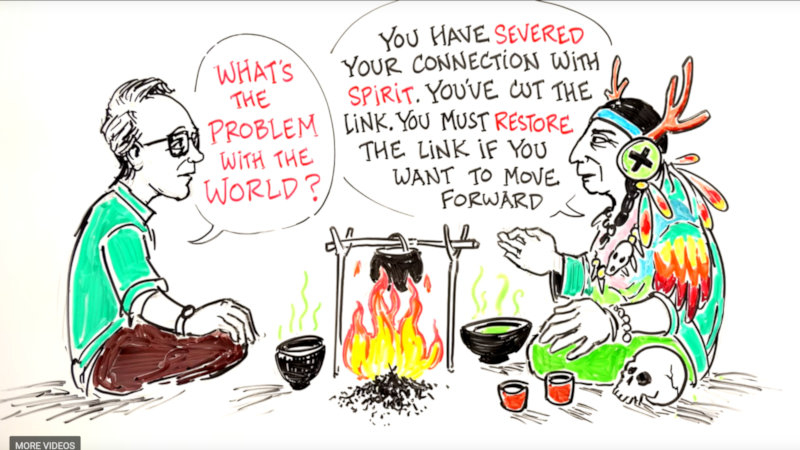What Graham Hancock gets so Laughably Wrong
Proviso
It should be understood that I am aware that the images are subject to interpretation and that mine is just one. While I have tried to be as free of bias as I can be in attempting to interpret Hancock’s meaning, I cannot promise that my own biases regarding his conclusions will not prejudice my remarks.
Fair Warning.
Also, while I’m fairly certain Hancock is not responsible for the animation accompanying his lecture, the fact that the former appears over the latter without (so far as I am aware) any disclaimer by him or his representatives means he cannot, in good faith, distance himself from them in any way.
I will, therefore, treat Graham Hancock as being the principle force behind these images and their meaning.
My Deconstruction of the Video
Most of what Hancock got wrong about the text, he displayed during his remarks after reading the excerpt of the Æsclepius. My rebuttal (vide supra) is of this interpretation, which I didn’t bother linking to his individual remarks.
What angered me initially was the visuals that accompanied the audio. I’ll summarize my thoughts on Hancock’s thesis after I’ve autopsied the message of his visuals.


These first two images are meant to tell us that expensive homes and fancy cars (even if we are fetishly in love with them?) are ‘severing our connection to spirit,’ as he says several time in his closing remarks.
So, are we talking about homes and cars in general or only the nicer ones? Is it better for us if we’re indigent and walking everywhere (or taking the bus, if we’re really pushing our luck)?
Is Hancock saying that the love of material things is bad?
The latter is a familiar refrain from religious authorities. Is there any truth to it?
There might be, if we interpret the saying as, “loving only material things (not people, for example) is bad.”
I doubt this is his meaning, because I know it was not the meaning of the originators of this doctrine, slightly altered from, “The love of money is the root of all evil.”
The priests who first proposed this, viewed poverty (and the resultant hardship) as a virtue.
This seemingly harmless pronouncement is the same one espoused by Mother Theresa to the horror of the victims residents of her hospices. They were denied even the most basic of sanitation and medical care so that they could die in agony for the ‘holiness’ it would confer upon them. Mother Theresa’s Order would actually lure patients from proper clinics to their hospices.
Mother Theresa stated that she found the sight of their suffering deaths glorious.
Hancock was either unaware of where the doctrine of the virtue of poverty leads, or chose to ignore it.

Even coffee leads to spiritual death, apparently.

The theme of black-eyed masks is prominent in the visuals in this video.
While there’s considerable room for interpretation here, the following images make Hancock’s meaning far less ambiguous that this first one does.
Eyelessness and masks are symbols of spiritual deadness.
Hancock seems to be saying that none of us can be ourselves in this fallen, corrupt world (that the world is fallen and corrupt, according to Hancock, is more than merely apparent from his speech).
Hancock’s condemnation of this metaphorical ‘wearing of masks’ is tiresomely misguided.
We all need to put on masks (certain mannerisms, rote sayings, modes of dress, &c.) to interact with our fellows. This isn’t new, nor is it restricted to our time and place in history.
No matter the context, level of wellbeing, or the size of the community, we all do this as a way of getting along. In no way do these social rituals mean we are not or cannot be ‘ourselves.’
It is basic to our psyches that we perform roles simply as a form of communication. It is, in fact, exactly what language itself is – symbols with agreed upon meanings which facilitate communication. Not only is this in and of itself harmless, it is necessary.


Socializing is evil, now; including sex. (I don’t think I’m far off in concluding that ‘love’ is not to be seen as being represented in the image immediately above.)
Hancock is pro-temperance, as well.

…and an anti-vaxxer.
With all the other pseudo-scientific, Deepak Chopra-esque woo woo Hancock has burdened us with, that he would oppose the vaccination of children is not at all surprising. It’s depressing, but not surprising.

Is he saying here that formal education is bad? Or does he merely lament the absence of his brand of religious indoctrination in the classroom. Shamanism 101, anyone?
Note the cubes around the students’ heads. Is this anti-standardization? The student with the coloured bubbles above his head may give us a clue. He may be lamenting the lack of creativity in learning, or the repression of imagination in modern schools.
If Hancock means the latter two, I may actually have some common ground with him.
In the context of his argument, I’m reasonably sure he thinks the students are being given something harmful, rather than being denied something useful.
Formal education is, evidently, one of the many evils separating us from spirit, whatever Hancock means by ‘spirit.’

I’m not sure what the teacher is supposed to be sucking out of the student’s head here, but this blatant disrespect of teachers is obnoxious.
I suppose he wants us to return to a simpler time before we knew what the sun was or where it went at night. That should fix everything up⸮

It’s just possible that Hancock is decrying the use of recreational drugs here.
While I do not oppose recreational drug use, per se, I agree that addiction is a bad thing. I shudder to think what Hancock’s prescription for that would be.
Let’s be real, here.
Hancock obviously thinks that pharmacology (I can actually hear him use the words “Big Pharma”) is a poison rather than a benefit. (He is anti-vaxx, after all.)

Surprise, surprise. Graham Hancock is against kinky sex.
Elsewhere on my blog, I have detailed my thoughts on human sexuality. (especially here.) For the nonce, suffice it to say I strongly assert that human sexuality should be celebrated in all its idiosyncratic variety and that shame has no place in the honest, consensual expression of our sexual natures.
I cannot say from this image where Hancock would fall on the issues surrounding the LGBTQ+ community, but I suspect he has some tediously spurious concerns.

Living in cities is bad, I guess.
That strongly implies that agriculture is also bad.
Why? Simple.
The first permanent settlements began–were necessary–when we began farming and herding. Humans needed to stay in one place to tend crops and livestock.
All this began about 11,700 B.P. Even today, we cannot all live simple nomadic lives because we are tied to one place in order to live.
Unless we can find a way to live alone and still maintain a good food supply, sanitation, and medical care for everyone, we must live in cities (towns, villages, whatever).
Honestly, I’m a bit confused as to what Hancock really thinks should be done here. Do we just disband large cities?
Should we introduce trees into them? We’ve already done that in just about every major city on Earth, so…
Maybe it’s just a back-to-nature thing. I agree that spending some time in nature is healthy, for our minds, at least. There’s nothing revolutionary about that idea though, which leads me to suspect Hancock is suggesting something far more radical.

By all means, lets discourage learning (newspapers) and communicating with each other (cell phones and social media), except face-to-face.
Fuck you, introverts! Adjust to the new, healthy way of living. And you can forget medication for the resultant anxiety and depression because Big Pharma wants to kill you!
We’re likely meant to condemn mass transportation as well. Hancock does hate cars, remember.

Yes! By all means, let’s ask someone who has never used any modern technology, or modern medicine, or been more than a dozen miles from his place of birth in the wilderness how to fix the problems of a global civilization of seven and a half billion people.
NOTE: If the Shaman is anywhere near as wise as Hancock gives him credit for, the former may well agree with Hermes and I, that our desire to abandon millennia of progress in understanding nature is the “severed…connection with spirit,” that Hancock laments. I am agnostic on this interpretation.
Addemdum
About a quarter of the images in this video I could make no sense of at all. If anyone watching it can give me any insight into any of them, please pass it along.
Another quarter were about conventional evils (war, pollution, &c.) that I can’t find any fault with.
